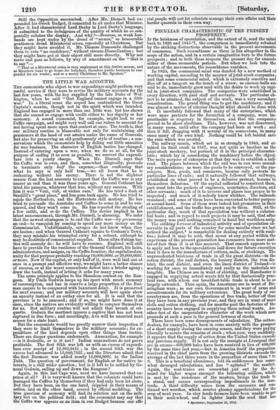THE LITTLE WAR ACCOUNTS.
THE economists who object to war expenditure might perform very useful service if they were to revise the military accounts for the last few years, with the key supplied by the late Duke of Wel- lington, when he said "that England cannot engage in a little war." In a literal sense the sequel has contradicted the Great Captain's maxim, though not in the spirit which was intended. England has engaged in more than one little war, but has shown that she cannot so engage with credit either to her dignity or her economy. A sound economist, for example, might look to our
Caffre campaign, and might very well call our rulers to account for not having spent more upon that contest at once. The truth is, that our military routine is blameable not only for maintaining old pensioners at the head of our armies under the name of Generals, but also for preserving an old-gentlemanly style of routine ; a eon- servatism which the economists help by doling out little annuities
for war business. The character of English tactics has changed. Instead of entering upon a war, when we do so at all, for the purpose of ending it as soon as possible, we convert the expendi- ture into a yearly charge. When Mr. Disraeli says that the Caffre war is over, and then, somewhat illogically, proceeds to terminate only half the expense,—thus confessing that what he says is only half true,—we all know that he is reckoning without his enemy. There is not the slightest reason from the last accounts to expect that the Caffre war is any nearer an end than it was three years ago. General Cathcart has tried his panacea, whatever that was, without any success. With him it was " Veni, vidi, et viotns sum." He has tried a dash at Sandilli's "great place," and has gone back again. He has tried to cajole the Hottentots, and the Hottentots still mutiny. He has tried to persuade the Amatolas and Caffres to come in and be con- quered, and they won't come in. He has reported the stealing of a few cattle, and so do the Caffres. The device implied in his latest announcement, through Mr. Disraeli, is alarming. We infer that the newest stratagem is to end the Caffre war—by presuming an end—to vanquish by ceasing to spend any more money on the Commissariat. Unfortunately' savages do not know when they are beaten ; and when General Cathcart repairs to Graham's Town, they may mistake his triumphal entry for a retreat, although he may be destitute of commissariat supplies. Those ultra-Fabian tac- tics will scarcely do : he will have to resume. England will still have to provide for the residence of the General Cathcart, his heirs, administrators, and assigns, on the Caffre frontier; the capitalizedan- unity for that purpose probably reaching 10,000,0001. or 20,000,0001. or more. Now if the capital, or only half of it, were well laid out at once in a prompt and effective way, we might have a better chance of success, or at the worst concentrate defeat into a briefer agony; draw the tooth, instead of letting it ache for many years.
The same principle applies to the Shandean contest on the Ran- goon. My Uncle Godwin keeps up his sport with much economy of consumption, and has in reserve a large proportion of the Bur- man empire to be conquered with luxuriant delay. It is preserved for next season; and our military accounts will here again show an annuity instead of an outlay once for all. It is said that the province is to be annexed; and if so, we might have done it at once, since the natives are evidently willing to conquer themselves for us. But military routine will not admit that breach of eti- quette. Godwin the martinet ignores a captive that has not been captured in due form; and accordingly, Ava will be unearted next season for a state hunt.
But the economists would too greatly narrow their inspection if
they were to limit themselves to the militau accounts; for ex- penditure of the kind depends upon other things than tactics. There are deeper questions underneath. Annexation, for example —is it desirable, or is it not? Indian annexations do not prove profitable. The first Sikh war left us with an excess of expendi- ture over receipt of 12,582,0411. ; in the second Sikh war the excess had advanced to 15,040,702/. ; and the Directors admit that the first Burmese war added nearly 15,000,0001. to the Indian Debt. The question of government, for -English or for native in- terests, is a still wider question; but is it left to be settled by Ge- neral Godwin, nailing up and down the Rangoon ?
Again, in this last Cape war, need we have incurred that ex- pense at all? It is verrwell known that the colonists could have managed the Caffres by themselves if they had only been let alone. But they have been, on the one hand, crippled in their means of action, and on the other hand, soured by official meddling. The true question of economy will find its solution not on the mili- tary but on the political field; and the economist may say that the CaEre war appears as an item in our Budget because our offi- cial people will not let colonists manage their own affairs and their border quarrels in their own way.


































 Previous page
Previous page